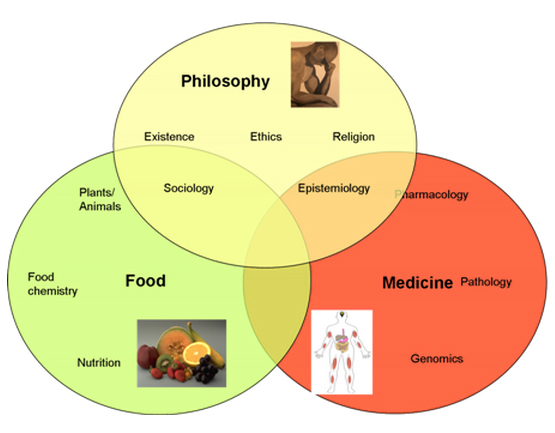2013-04-03 00:00:00
What determines what we eat? Nat. science, culture, philosophy or religion? Is the human body more than a chemical machine? Widely different diet and health traditions come closer in a globalized world but understanding other traditions is difficult. Food/health topics relate to nat. science as well as to culture/philosophy/religion. Food/medicine differ between East/West, in mixtures of natural/social/human sciences. This course helps understand the scientific interactions, contrasts and synergies.

Course background
Diet and health traditions have become globalized. On the other hand, diet and health views differ widely and are not determined by food availability, health care, technology and science alone. Cultural and philosophical views of nature and the human body continue to be important. What determines what we eat and how we stay healthy? Natural science, culture, philosophy or religion? Is food just fuel for the body machine, or is food ≈ medicine? Can “functional foods” be defined? How does academic food and health science relate to business, culture and religion? The answers vary among different geographical regions. More insights may lead to better communication.
Target students
PhD students with research into nutrition, food science, sociology, anthropology, medicine, pharmacy, philosophy, religion/theology or related fields. A few MSc students, post docs or others may participate and a separate course fee applies for non-PhD students. All nationalities welcome and we encourage international exchange. The course is run by the Department of Human Nutrition, University of Copenhagen, together with the PhD Research School FOOD Denmark
Course duration and credits (3 options)
Full course, Denmark + China: 3 weeks, 6 ECTS
Denmark or China, with report: 2 weeks, 4 ECTS
Denmark + China, without report: 1 week, 2 ECTS
Sample topics for individual reports (modified individually according to specific PhD studies)
1) The physics and chemistry of food: Its science, culture and philosophy in East and West
2) Nutritional health of the human body: Science, culture and philosophy in East and West
3) Functional foods and bioactive nutrients: The trends in East and West - and why?
4) Traditional Chinese Medicine (TCM) and Western medicine - room for cross talk?
5) Diet, nutrition and health - the secular and modern perspective versus traditional views.
6) Diet, nutrition and health - the religious perspective(Christian, Taoist, Buddhist, Hindu)?
7) Natural science and religion - mutual interactions and conflicts in East and West.
8) Diet-related life-style diseases/obesity - do philosophy, culture and religion play a role?
9) Differences in the way food and health relates to business and society in East and West
10) “Hospital philosophies” and the views towards nutrition and disease in East and West
11) The science and philosophy/religion of vegetarian life-style in East and West
Course fee (lectures, field studies, examination, total 3 weeks)
Lectures and lecture materials are provided free of charge. Separate expenses for the field work in China is to be covered by each student. These are (approximately):
- 7000 DKK (Flight ticket, Copenhagen-Hong Kong, Guangzhou-Copenhagen)
- 4500 DKK (10 days accommodation in China (double room; single room: + 3000 DKK)
- 4500 DKK (10 days food and beverages in China)
- 2100 DKK (Common transport and service fees Hong Kong Kong/Guangzhou)
- 1000 DKK (Appr. amount for individual transport/eating in China paid during course)
- 500 DKK (Visa to China)
- 19600 DKK (Total)
Each student arrange own travel (flights+VISA), according to advice from the course secretariat. The expenses for 10 days accomodation, transport, eating and services in China (11.100 DKK for double room) must be paid to the course secretariat (see below) before the start of the course. Students must accept that attempts are made to keep total course expenses minimal.
Course coordinator
Per T. Sangild,
Professor of Nutrition, PhD, DSc,
Department of Human Nutrition, University of Copenhagen
30 Rolighedsvej, R276, DK-1958 Frederiksberg C, Denmark
Tel +45 35 33 26 98, mobile +45 26 16 05 30; mail [email protected]
Co-responsible in 2011
Ass. Prof., Dr. Jonas Jøgensen, Faculty of Theology, University of Copenhagen
Ass. Prof., Dr Jennifer Wan, Faculty of Biological Sciences, University of Hong Kong
Abraham Chan, Bridge & Dialoque Division, Tao Fong Shan Christian Centre, Hong Kong
Course secretariat
Marianne Støckel (MS),
Departmental Teaching Coordinator,
Department of Human Nutrition, Faculty of Life Sciences, University of Copenhagen
30 Rolighedsvej, DK-1958 Frederiksberg C, Denmark
Phone: +45 35 33 21 91, [email protected]
For More Information
Download the Official Course Announcement
Visit the Home Page of the Course
